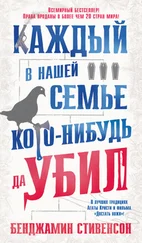Бенджамин Дизраэли - Tancred
Здесь есть возможность читать онлайн «Бенджамин Дизраэли - Tancred» весь текст электронной книги совершенно бесплатно (целиком полную версию без сокращений). В некоторых случаях можно слушать аудио, скачать через торрент в формате fb2 и присутствует краткое содержание. Год выпуска: 2014, Издательство: epubBooks Classics, Жанр: Классическая проза, на английском языке. Описание произведения, (предисловие) а так же отзывы посетителей доступны на портале библиотеки ЛибКат.
- Название:Tancred
- Автор:
- Издательство:epubBooks Classics
- Жанр:
- Год:2014
- ISBN:нет данных
- Рейтинг книги:4 / 5. Голосов: 1
-
Избранное:Добавить в избранное
- Отзывы:
-
Ваша оценка:
- 80
- 1
- 2
- 3
- 4
- 5
Tancred: краткое содержание, описание и аннотация
Предлагаем к чтению аннотацию, описание, краткое содержание или предисловие (зависит от того, что написал сам автор книги «Tancred»). Если вы не нашли необходимую информацию о книге — напишите в комментариях, мы постараемся отыскать её.
Tancred — читать онлайн бесплатно полную книгу (весь текст) целиком
Ниже представлен текст книги, разбитый по страницам. Система сохранения места последней прочитанной страницы, позволяет с удобством читать онлайн бесплатно книгу «Tancred», без необходимости каждый раз заново искать на чём Вы остановились. Поставьте закладку, и сможете в любой момент перейти на страницу, на которой закончили чтение.
Интервал:
Закладка:
Tancred
Or, The New Crusade
Earl of Beaconsfield Benjamin Disraeli
Chapter I.
A Matter of Importance
IN THAT part of the celebrated parish of St. George which is bounded on one side by Piccadilly and on the other by Curzon Street, is a district of a peculiar character. 'Tis cluster of small streets of little houses, frequently intersected by mews, which here are numerous, and sometimes gradually, rather than abruptly, terminating in a ramification of those mysterious regions. Sometimes a group of courts develops itself, and you may even chance to find your way into a small market–place. Those, however, who are accustomed to connect these hidden residences of the humble with scenes of misery and characters of violence, need not apprehend in this district any appeal to their sympathies, or any shock to their tastes. All is extremely genteel; and there is almost as much repose as in the golden saloons of the contiguous palaces. At any rate, if there be as much vice, there is as little crime.
No sight or sound can be seen or heard at any hour, which could pain the most precise or the most fastidious. Even if a chance oath may float on the air from the stable–yard to the lodging of a French cook, 'tis of the newest fashion, and, if responded to with less of novel charm, the repartee is at least conveyed in the language of the most polite of nations. They bet upon the Derby in these parts a little, are interested in Goodwood, which they frequent, have perhaps, in general, a weakness for play, live highly, and indulge those passions which luxury and refinement encourage; but that is all.
A policeman would as soon think of reconnoitring these secluded streets as of walking into a house in Park Lane or Berkeley Square, to which, in fact, this population in a great measure belongs. For here reside the wives of house–stewards and of butlers, in tenements furnished by the honest savings of their husbands, and let in lodgings to increase their swelling incomes; here dwells the retired servant, who now devotes his practised energies to the occasional festival, which, with his accumulations in the three per cents., or in one of the public–houses of the quarter, secures him at the same time an easy living, and the casual enjoyment of that great world which lingers in his memory. Here may be found his grace's coachman, and here his lordship's groom, who keeps a book and bleeds periodically too speculative footmen, by betting odds on his master's horses. But, above all, it is in this district that the cooks have ever sought a favourite and elegant abode. An air of stillness and serenity, of exhausted passions and suppressed emotion, rather than of sluggishness and of dullness, distinguishes this quarter during the day.
When you turn from the vitality and brightness of Piccadilly, the park, the palace, the terraced mansions, the sparkling equipages, the cavaliers cantering up the hill, the swarming multitude, and enter the region of which we are speaking, the effect is at first almost unearthly. Not a carriage, not a horseman, scarcely a passenger; there seems some great and sudden collapse in the metropolitan system, as if a pest had been announced, or an enemy were expected in alarm by a vanquished capital. The approach from Curzon Street has not this effect. Hyde Park has still about it something of Arcadia. There are woods and waters, and the occasional illusion of an illimitable distance of sylvan joyance. The spirit is allured to gentle thoughts as we wander in what is still really a lane, and, turning down Stanhope Street, behold that house which the great Lord Chesterfield tells us, in one of his letters, he was 'building among the fields.' The cawing of the rooks in his gardens sustains the tone of mind, and Curzon Street, after a long, straggling, sawney course, ceasing to be a thoroughfare, and losing itself in the gardens of another palace, is quite in keeping with all the accessories.
In the night, however, the quarter of which we are speaking is alive. The manners of the population follow those of their masters. They keep late hours. The banquet and the ball dismiss them to their homes at a time when the trades of ordinary regions move in their last sleep, and dream of opening shutters and decking the windows of their shops.
At night, the chariot whirls round the frequent corners of these little streets, and the opening valves of the mews vomit forth their legion of broughams. At night, too, the footman, taking advantage of a ball at Holdernesse, or a concert at Lansdowne House, and knowing that, in either instance, the link–boy will answer when necessary for his summoned name, ventures to look in at his club, reads the paper, talks of his master or his mistress, and perhaps throws a main. The shops of this district, depending almost entirely for their custom on the classes we have indicated, and kept often by their relations, follow the order of the place, and are most busy when other places of business are closed.
A gusty March morning had subsided into a sunshiny afternoon, nearly two years ago, when a young man, slender, above the middle height, with a physiognomy thoughtful yet delicate, his brown hair worn long, slight whiskers, on his chin a tuft, knocked at the door of a house in Carrington Street, May Fair. His mien and his costume denoted a character of the class of artists. He wore a pair of green trousers, braided with a black stripe down their sides, puckered towards the waist, yet fitting with considerable precision to the boot of French leather that enclosed a well–formed foot. His waistcoat was of maroon velvet, displaying a steel watch–chain of refined manufacture, and a black satin cravat, with a coral brooch. His bright blue frockcoat was frogged and braided like his trousers. As the knocker fell from the primrose–coloured glove that screened his hand, he uncovered, and passing his fingers rapidly through his hair, resumed his new silk hat, which he placed rather on one side of his head.
'Ah! Mr. Leander, is it you?' exclaimed a pretty girl, who opened the door and blushed.
'And how is the good papa, Eugenie? Is he at home? For I want to see him much.'
'I will show you up to him at once, Mr. Leander, for he will be very happy to see you. We have been thinking of hearing of you,' she added, talking as she ushered her guest up the narrow staircase. 'The good papa has a little cold: 'tis not much, I hope; caught at Sir Wallinger's, a large dinner; they would have the kitchen windows open, which spoilt all the entrées, and papa got a cold; but I think, perhaps, it is as much vexation as anything else, you know if anything goes wrong, especially with the entrées―—'
'He feels as a great artist must,' said Leander, finishing her sentence. 'However, I am not sorry at this moment to find him a prisoner, for I am pressed to see him. It is only this morning that I have returned from Mr. Coningsby's at Hellingsley: the house full, forty covers every day, and some judges. One does not grudge one's labour if we are appreciated,' added Leander; 'but I have had my troubles. One of my marmitons has disappointed me: I thought I had a genius, but on the third day he lost his head; and had it not been― Ah! good papa,' he exclaimed, as the door opened, and he came forward and warmly shook the hand of a portly man, advanced in middle life, sitting in an easy chair, with a glass of sugared water by his side, and reading a French newspaper in his chamber robe, and with a white cotton nightcap on his head.
'Ah! my child,' said Papa Prevost, 'is it you? You see me a prisoner; Eugenie has told you; a dinner at a merchant's; dressed in a draught; everything spoiled, and I―—' and sighing, Papa Prevost sipped his eau sucrée .
'We have all our troubles,' said Leander, in a consoling tone; 'but we will not speak now of vexations. I have just come from the country; Daubuz has written to me twice; he was at my house last night; I found him on my steps this morning. There is a grand affair on the tapis. The son of the Duke of Bellamont comes of age at Easter; it is to be a business of the thousand and one nights; the whole county to be feasted. Camacho's wedding will do for the peasantry; roasted oxen, and a capon in every platter, with some fountains of ale and good Porto. Our marmitons, too, can easily serve the provincial noblesse; but there is to be a party at the Castle, of double cream; princes of the blood, high relatives and grandees of the Golden Fleece. The duke's cook is not equal to the occasion. 'Tis an hereditary chef who gives dinners of the time of the continental blockade. They have written to Daubuz to send them the first artist of the age,' said Leander; 'and,' added he, with some hesitation, 'Daubuz has written to me.'
Читать дальшеИнтервал:
Закладка:
Похожие книги на «Tancred»
Представляем Вашему вниманию похожие книги на «Tancred» списком для выбора. Мы отобрали схожую по названию и смыслу литературу в надежде предоставить читателям больше вариантов отыскать новые, интересные, ещё непрочитанные произведения.
Обсуждение, отзывы о книге «Tancred» и просто собственные мнения читателей. Оставьте ваши комментарии, напишите, что Вы думаете о произведении, его смысле или главных героях. Укажите что конкретно понравилось, а что нет, и почему Вы так считаете.
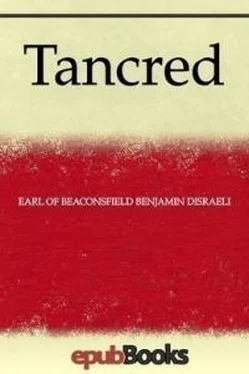
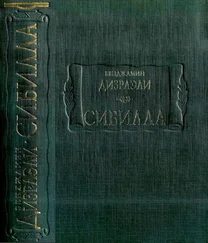

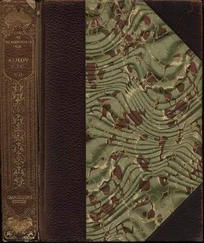


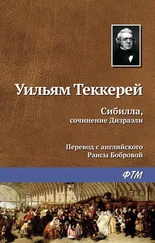
![Мелани Бенджамин - Госпожа отеля «Ритц» [litres]](/books/384861/melani-bendzhamin-gospozha-otelya-ritc-litres-thumb.webp)



